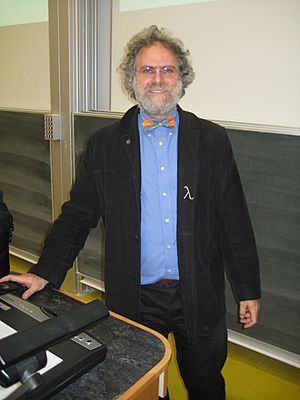Philip Wadler facts for kids
Quick facts for kids
Phil Wadler
FRS FRSE
|
|
|---|---|

Wadler before a lecture at the University of Edinburgh
|
|
| Born |
Philip Lee Wadler
April 8, 1956 |
| Citizenship | American |
| Alma mater |
|
| Known for |
|
| Awards |
|
| Scientific career | |
| Fields | Computer science, programming languages |
| Institutions |
|
| Thesis | Listlessness is Better than Laziness: An Algorithm that Transforms Applicative Programs to Eliminate Intermediate Lists (1984) |
| Doctoral advisor | Nico Habermann |
Philip Lee Wadler, born on April 8, 1956, is an American computer scientist who lives in the UK. He is famous for helping to design programming languages and understanding how they work. He is a professor of theoretical computer science at the University of Edinburgh.
Wadler has done important work on functional programming, which is a way of writing computer code. He also helped create the Haskell programming language and the XQuery language. In 1984, he made his own language called Orwell. He also helped add new features, called generic types, to Java 5.0.
Contents
Education and Early Career
Studying Computer Science
Phil Wadler studied mathematics at Stanford University, earning his first degree in 1977. He then went to Carnegie Mellon University for his master's degree in computer science, which he finished in 1979. He continued his studies at Carnegie Mellon, earning his PhD in computer science in 1984. His PhD project was about making computer programs more efficient.
Working at Universities and Labs
From 1983 to 1987, Wadler was a researcher at Oxford University. He then worked as a professor at the University of Glasgow from 1987 to 1996. After that, he joined Bell Labs and later Avaya Labs, which are research companies. Since 2003, he has been a professor at the University of Edinburgh.
Research and Contributions
Understanding Programming Languages
Wadler's main interest is in programming languages. He studies how they are designed and how they can be made better. He has explored how to use "monads" in functional programming, which are special tools that help manage complex tasks in code.
Developing New Languages and Features
At the University of Edinburgh, Wadler is a professor of theoretical computer science. Around 2006, he worked on a new functional language called Links. This language was designed for building web applications, which are programs that run on the internet. He has also guided many students who were getting their PhDs.
Work with Blockchain Technology
Since 2018, Wadler has also been a senior researcher at Input Output Global (IOHK). This company works on blockchain technology, like the Cardano platform. He has helped develop Plutus, which is a special language for writing "smart contracts" on Cardano. Smart contracts are like digital agreements that run automatically. He also worked on other parts of Cardano, such as how it handles digital money and tokens.
Awards and Recognition
Honors for His Work
In 2003, Wadler received an award for a very important paper he wrote ten years earlier. This paper, written with Simon Peyton Jones, was about combining different programming styles. In 2005, he was chosen as a Fellow of the Royal Society of Edinburgh. This is a special honor for scientists in Scotland.
Becoming a Fellow
In 2007, he became a fellow of the Association for Computing Machinery (ACM). This is a big honor in the world of computer science. Most recently, in 2023, he was elected a Fellow of the Royal Society. This is one of the oldest and most respected scientific honors in the world.
 | Laphonza Butler |
 | Daisy Bates |
 | Elizabeth Piper Ensley |

